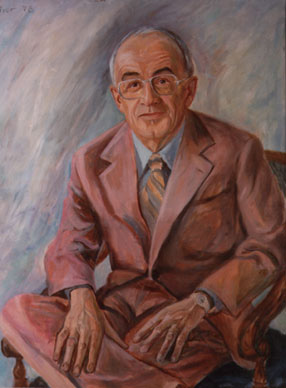Ludwig Bölkow facts for kids
Quick facts for kids
Ludwig Bölkow
|
|
|---|---|

Portrait by Günter Rittner, 1978
|
|
| Born | 30 June 1912 |
| Died | 25 July 2003 (aged 91) |
| Nationality | German |
| Occupation | Aerospace engineering |
Ludwig Bölkow was a brilliant German engineer. He was a pioneer in the world of airplanes and space travel. He helped design famous aircraft and even launched Germany's first satellite!
Contents
Early Life and Inspiration
Ludwig Bölkow was born in Schwerin, Germany, in 1912. His father worked as a foreman for Fokker, a famous company that built airplanes. This likely sparked Ludwig's interest in aviation from a young age.
Starting His Career in Aviation
Ludwig Bölkow began his career at Heinkel, another aircraft company. After this, he went to study aero-engineering at the Technical University in Berlin.
In 1939, after graduating, he joined Messerschmitt AG in Augsburg. He started as a clerk but soon became a group leader. He focused on making planes fly faster, especially for the Messerschmitt Me 262 jet.
Developing Fighter Jets
In 1943, Ludwig became the head of the Messerschmitt Bf 109 development office in Vienna. A year later, he returned to Messerschmitt's main project office. This office had moved to Oberammergau. There, he started a special project to develop the Messerschmitt P.1101 jet fighter.
Building a Big Aerospace Company
After World War II, Ludwig Bölkow started his own company called Bölkow GmbH. It was located in Ottobrunn. Over time, this company grew very large. It merged with others to become MBB (Messerschmitt-Bölkow-Blohm). This became Germany's biggest aerospace and spaceflight company. In the early 1990s, a company called DASA bought MBB.
Launching Germany's First Satellite
Ludwig Bölkow also led the team that built Germany's very first satellite. This satellite was named Azur. It was successfully launched into space in 1969. This was a huge step for Germany in space exploration!
Awards and Recognition
Ludwig Bölkow received many important awards for his work. In 1972, he was given the Ludwig-Prandtl-Ring. This award is from the German Society for Aeronautics and Astronautics. It recognized his "outstanding contribution in the field of aerospace engineering." In 1978, the British Royal Aeronautical Society also honored him with a Gold Medal.
See also
 In Spanish: Ludwig Bölkow para niños
In Spanish: Ludwig Bölkow para niños
 | Laphonza Butler |
 | Daisy Bates |
 | Elizabeth Piper Ensley |

